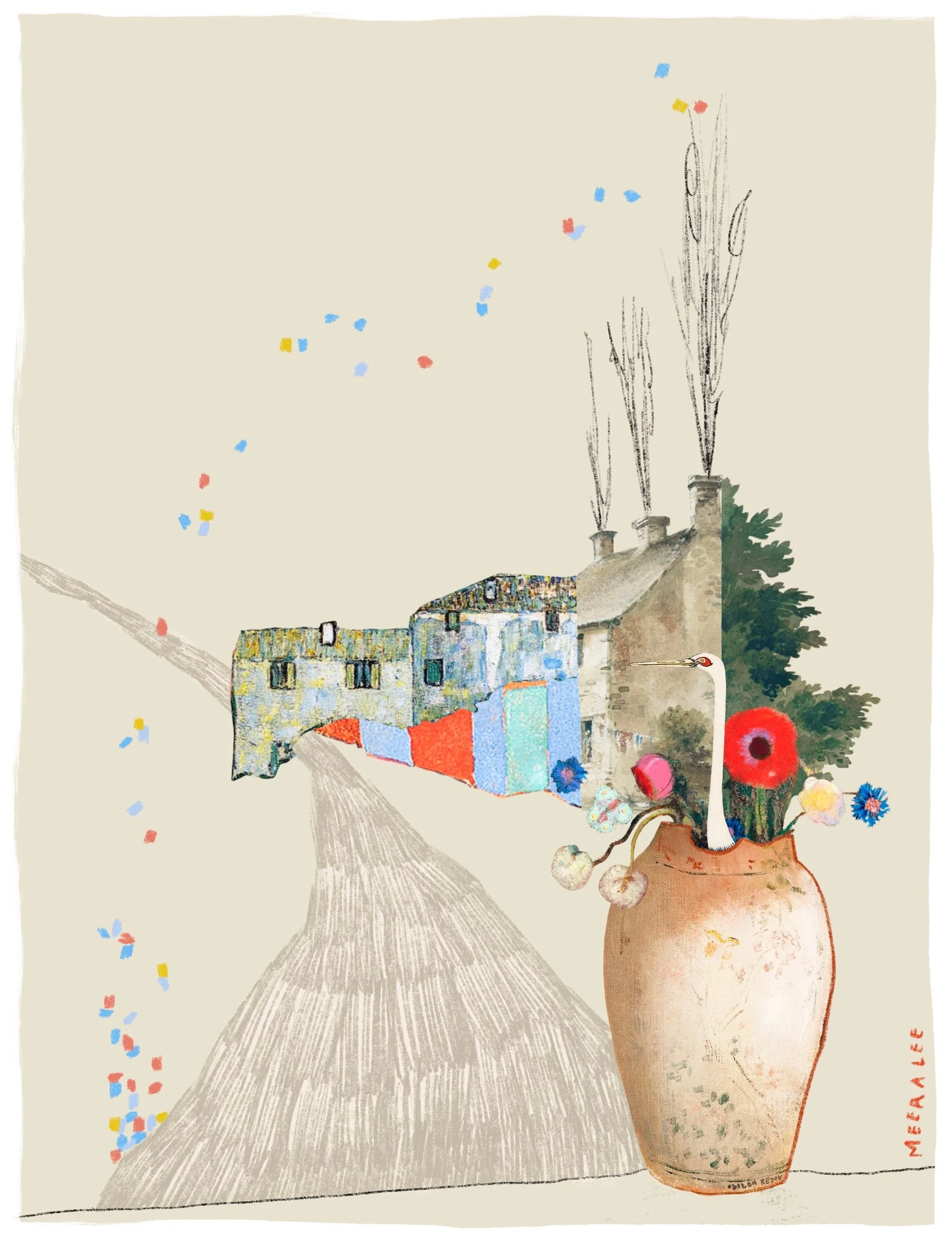The artwork for a recent collaboration with Golden Hour Candle Co.
A year from now, here are five things from this week that I'd like to remember:
MONDAY
I wake up wanting to find the golden thread.
I do my morning chores. The dog waits to go out. It’s still dark but the robins woke well before me. They sing; we listen. I wonder if they ever tire of doing the bird thing, if even the miracle of flying feels like a slog once in awhile. The golden thread is everywhere: in the leaves fluttering in the wind; in the birds, filling the air with their song; in the light streaming over my head. I can still see a few stars pressed faintly against the sky. They will soon leave; they will return.
The first person I see is F. I let her wail for 15 minutes and then I go to retrieve her. She lays face down in her crib in resignation, but when I turn her over, she’s smiling. The golden thread is here: in her mess of long hair, much too long for her body; in her golden, gummy smile that stretches over her entire face and into whatever space she occupies; in her tiny little hands that find tiny specks of dust to examine and eat; in her laugh, which begins deep inside her belly and bubbles over, finally, when it’s too much for her body to hold. The golden thread is in her absence of desire. She is herself and that is enough.
Next is T, who is still sleepy for at least an hour post-wake. He stumbles down the stairs and F rushes over to look up at him, in full cobra pose. She adores her dad and I adore their relationship, so easy and full of endearment. The golden thread is everywhere: in his morning smile, genuine and full of teeth; in his goofy humor, always looking to score a laugh; his mild temperament. The golden thread is his earnest demeanor, so willing, always, to build towards a greater love.
By the time N makes it to breakfast, I’ve found enough thread for a few spools. She is cross and hungry, her typical early-hours disposition. She reminds me a lot of me, except for when I can’t relate to her at all. Still, I don’t have to look very hard for the thread: it’s in her delicate grasp, the way she buries her face in the couch, consumed by her oversized feelings. It’s in her small, matter-of-fact voice when she replies “not now, but after school with my afternoon one” when I ask if I can give her a morning kiss. It’s in the way she immediately brightens and blooms after her first few bites of breakfast. “I think I was really hungry,” she says. “And tired. But I feel better now.” Golden threads radiate from her like sun rays.
After N leaves from school, I clean the kitchen and do the dishes. I wash the oatmeal pot and find myself in its metal reflection. My hair is crumpled, my skin is tired, but my eyes are alive. Not bad, I think. A person who looks for the golden thread: not always without fail and not always with ease, but someone who tries, anyhow. A golden thread.
TUESDAY
I’m so excited to share this collaboration with my dear friend Nirali, the owner of Golden Hour Candle Co..
I was given complete freedom to create whatever I wanted, which is obviously my favorite kind of project. The artwork for this collaboration was inspired by my own ever-changing definition of feminism—one where the efforts of caregiving is shared by all beings because it is valued as necessary, respected work.
It is grounded in the promise of the three young girls in my life: my two young daughters and my niece, who came into the world carrying the greatest love there is—the love they have for themselves. The ultimate golden thread.
The crewnecks are available for purchase here on the Golden Hour website.
WEDNESDAY
This particular section from Austin Kleon';s newsletter, We Love Because We Care:
In her book, The Gardener and the Carpenter, Alison Gopnik advocates for abandoning the word “parenting” as a verb. She encourages readers to think of being a parent as a relationship that runs on love, instead of a job that runs on work.
“Love doesn’t have goals or benchmarks of blueprints,” she writes, “but it does have a purpose.” The purpose of loving children is to care for them as a gardener would tend to plants, creating the conditions under which they will thrive.
This caring, she says, changes us, and deepens our love. “We don’t care for children because we love them,” she writes, “we love them because we care for them.”
THURSDAY
“Perhaps the most important truth I’ve learned across the whole of my life is that it’s only when I yield to the river and embrace the journey that I find peace.”
—from William Kent Krueger’s This Tender Land, my current read
FRIDAY
The value of an individual life a credo they taught us
to instill fear, and inaction, 'you only live once'
a fog on our eyes, we are
endless as the sea, not separate, we die
a million times a day, we are born
a million times, each breath life and death:
get up. put on your shoes, get
started, someone will finish
—from Revolutionary Letter #2 by Diane di Prima
xx,
M
To sign up for my weekly newsletter, Dear Somebody, please subscribe here.
















































